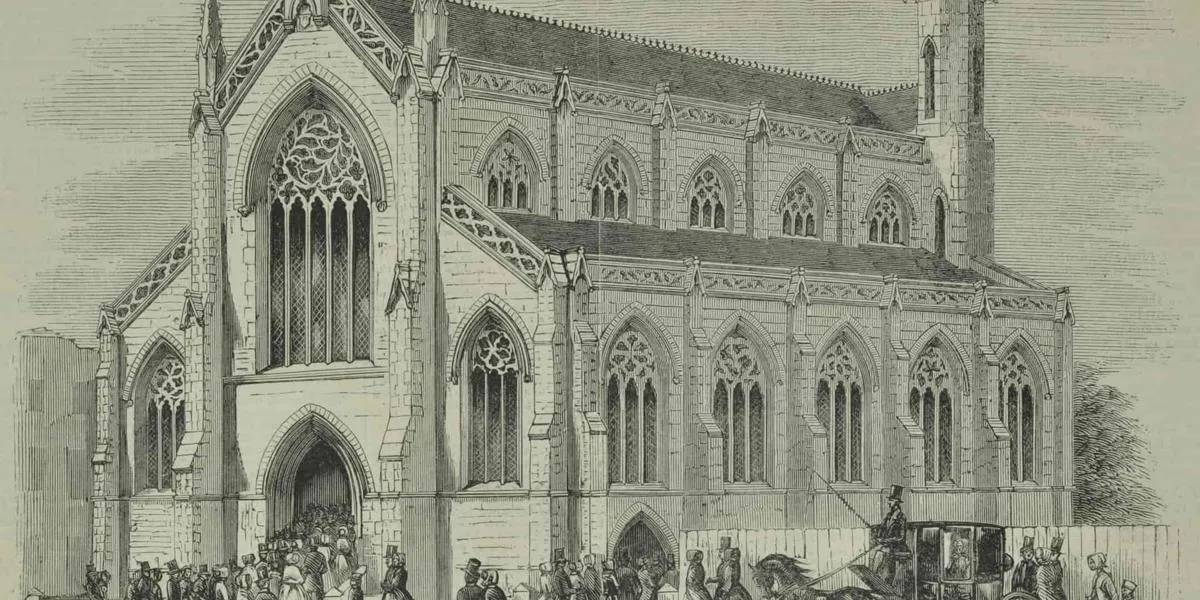Nonconformist records

1. About this guide
This guide explains how to trace people in London who did not belong to the established church (known as nonconformists or dissenters). Since 1559, the established church in England has been the Church of England (Anglican Church).
The majority of nonconformist records at The London Archives relate to the Methodist, Congregationalist, Baptist and United Reformed (a union of the Congregational and Presbyterian churches) denominations.
2. Nonconformist birth, marriage and death registers
2.1 What do I need to know before I start?
The persecution of dissenters meant that Nonconformist congregations didn’t produce registers of birth, marriage or death until the 1640s as they didn’t want to create evidence of dissent.
Births/baptisms
- Birth and baptism registers are the most commonly kept record
- Some births and baptisms can be found in Anglican records as Acts of Parliament in 1695 and 1700 required all nonconformists births to be recorded with the local Anglican priest. These acts were however largely ignored by clergy and most nonconformist children were baptised into their parents' denomination
Marriages
- Marriages before 1837 can largely be found in Anglican records as Lord Hardwicke's Marriage Act of 1753 required every marriage in England to be performed in the Church of England. Jews and Quakers were however exempt from this Act
- After civil registration was introduced on 1 July 1837, marriages could take place again in non-conformist chapels but, until 1899, a civil registrar had to be present
- On 1 April 1899, the Marriage Act of 1898 came into force allowing nonconformist churches to appoint their own authorised person to register marriages. Nonconformist marriage registers are therefore most likely to exist from 1899 onwards
Burials
- Burials before the 1850s can mainly be found in Anglican records
- From the 17th Century, some nonconformist burial grounds were founded. The main ones in London were Bunhill Fields (opened 1655) and Abney Park Cemetery (opened 1840)
2.2 Online Records
The following records are available to search on Ancestry.co.uk:
- Non-conformist registers, 1694–1931
- Church of England Baptisms, Marriages and Burials, 1538–1812
- Church of England Births and Baptisms, 1813–1923
- Church of England Marriages and Banns, 1754–1938
- Church of England Deaths and Burials, 1813–2003
2.3 Records only available at The London Archives
Nonconformist registers, 1932 to present are not available online. Please browse the list of nonconformist collections on our catalogue (sort by title and change the results per page to 100) to find out what registers survive for each congregation. You could also try searching the catalogue by keyword(s).
2.4 Records at The National Archives
Many nonconformist registers were collected by the General Register Office in 1837 and 1857 and are now kept at The National Archives. Many of these registers can be searched on Ancestry.co.uk – see Non-Conformist and Non-Parochial Registers, 1567–1936. An index is available on FamilySearch – see Non-Conformist Record Indexes (RG4-8), 1588–1977.
Please see The National Archives research guide for further information: How to look for records of...Nonconformists.
3. Nonconformists in sessions records
The sessions records in CLA/047/LR/02/02 and MR/R/C make specific reference to the prosecution of nonconformists. They include certificates of convictions for holding conventicles (secret religious meetings) under an act of 1664 which imposed a fine on people convicted of assembling in a group of more than five for the practice of religion other than that laid down by the Church of England.
Under the Toleration Act of 1689 ministers or groups of dissenters were permitted to apply for a licence to legitimise their meeting premises. Licences for meeting houses could be granted by both the Court of Quarter Sessions and the Bishop or Archdeacon. For records of meeting houses licensed by the City of London and Middlesex Sessions see CLA/047/LR/02/04/001 and MR/R/H. Some licences can also be found with the Middlesex sessions papers in MJ/SP.
4. Nonconformists in diocesan records
Office Act Books and Visitation Books
Office Act books and Visitation books contain information regarding individuals who were presented before the church court for misdemeanours such as non attendance at church and nonconformist activity. The key records are:
- Consistory Court of London Office Act books in DL/C/0300–0329 and DL/C/0614–0626
- Archdeaconry Court of Surrey Visitation books in DW/VB
Certificates for registering Dissenters Meeting Houses, 1741-1852
These certificates were produced under 1689 Toleration Act. Details generally include the location of the meeting house, denomination and less frequently, the signatures of ministers and members of the congregation. They key records are:
- Certificates for registering dissenters’ meeting houses 1689–1719, 1763 in DL/A/E/202/MS09579
- Registers of dissenters’ meeting houses, 1791–1852 in DL/A/E/200/MS09580
- Dean and Chapter Commissary's muniment book, 1694–1779 in CLC/313/C/007/MS25665
- Register of certificates for the licensing of dissenting meeting houses, 1779–1847 in CLC/313/K/A/002/MS25726
- Archdeaconry of Surrey: Certificates for registering dissenters’ meeting houses, 1741–1852 in DW/D
5. Nonconformist organisations, associations and charities
We also hold records of many Nonconformist organisations, associations and charities. These include the registers and papers of Joanna Southcott’s Sect in ACC/1040, Golden Lane and Radnor Street Methodist Sunday Schools in N/M/017, Southend Homes of Rest in ACC/1926/E, The Liberation Society in A/LIB, The National Education Association in A/NEA, The London Congregational Union in N/LCU and several Methodist Circuits and Missions. For charitable activities, see the records of the Leysian Mission Circuit in ACC/3422 and Whitechapel Methodist Mission in ACC/1926.